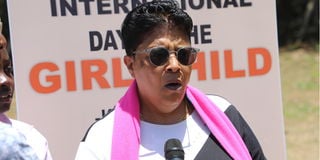Disco matanga blamed for fuelling early pregnancies in Kilifi

Outgoing Gender executive Anisa Omar during celebrations to mark the International Day of Girl Child at Kibaoni Social Hall in Kilifi town.
A task force has identified poor parenting, disco matanga and poverty as the main factors behind teenage pregnancies in Kilifi County.
Other influences are a retrogressive culture in the community that forces girls into early marriages, turning them into parents at a tender age.
The team was created by former Kilifi governor Amason Kingi in 2019 to find the causes of underage pregnancies that had led to poor education standards and low scores in national examinations, dropouts and early marriages among schoolgirls.
Speaking during celebrations to mark the International Day of the Girl Child in Kilifi town on Tuesday, outgoing Gender executive Anisa Omar said girls in the county face many challenges that undermine their education.
She said the dropout rate for girls is higher than that of boys and that few girls join Form One because the county is “leading in teenage pregnancies”.
Many parents, Dr Omar claimed, know that their daughters go to disco matanga (funeral parties), which she added are venues for crime and immorality.
“People take drugs, alcohol and many sex incidents are happening at the disco matanga, and our girls become pregnant,” she said.
Early marriages contributed to high poverty in the county, she added.
“When a girl becomes pregnant, her parents demand to know the perpetrator and after they do, who in this case accepts the offence, they call for a kangaroo court. The family pays the pride price, and the girl is married off,” she said.
“We find that the minor is taking care of a baby and the cycle continues. Even her child will face the same challenges living in poverty.”
Dr Omar said the task force reviewed gender policies at the county and national levels and issued its recommendations.
The county government and Plan International, she said, are working on a child protection policy for schoolgirls and interventions the children's department could make to teach people about positive parenting.
Kilifi is among the counties to conduct pilot projects in positive parenting.
The team also held discussions with community groups in every sub-county.
The county government needs to give priority to protecting girls and other young people and implement existing policies, said Leila Abdikheir, a former president of the Kilifi Youth Advisory Council.
The policies include those on gender-based violence and menstrual hygiene and gender equity.
“The county government needs to [enforce] existing laws and enact new ones to allocate resources,” she said.
“The challenges facing the girls are due to a lack of information. Many who have dropped out of school have no access to resources.”
Stakeholders must help prevent girls from dropping out of school and ensure 100 percent transition from primary to secondary school and to tertiary institutions, said Georgina Dulu, the director of the state department for gender in Kilifi County.
Society and parents must also adopt positive parenting and take girls back to school, said Kilifi Assistant County Commissioner Shally Rono.
“Many girls in Kilifi are out of school through issues of teenage pregnancies. We work with non-state actors and partners to ensure we address the challenges facing the girls and retain them in schools,” she said.





